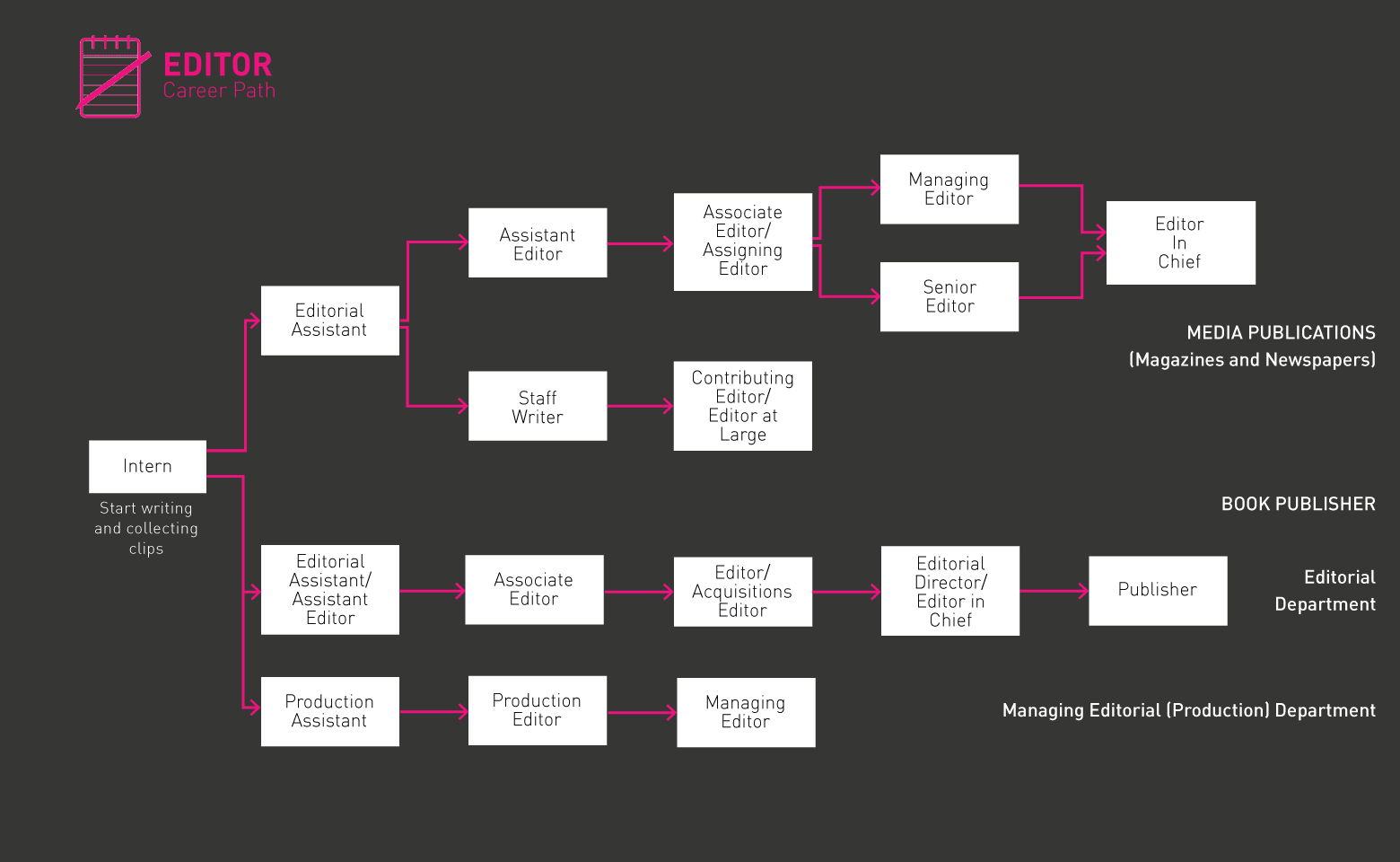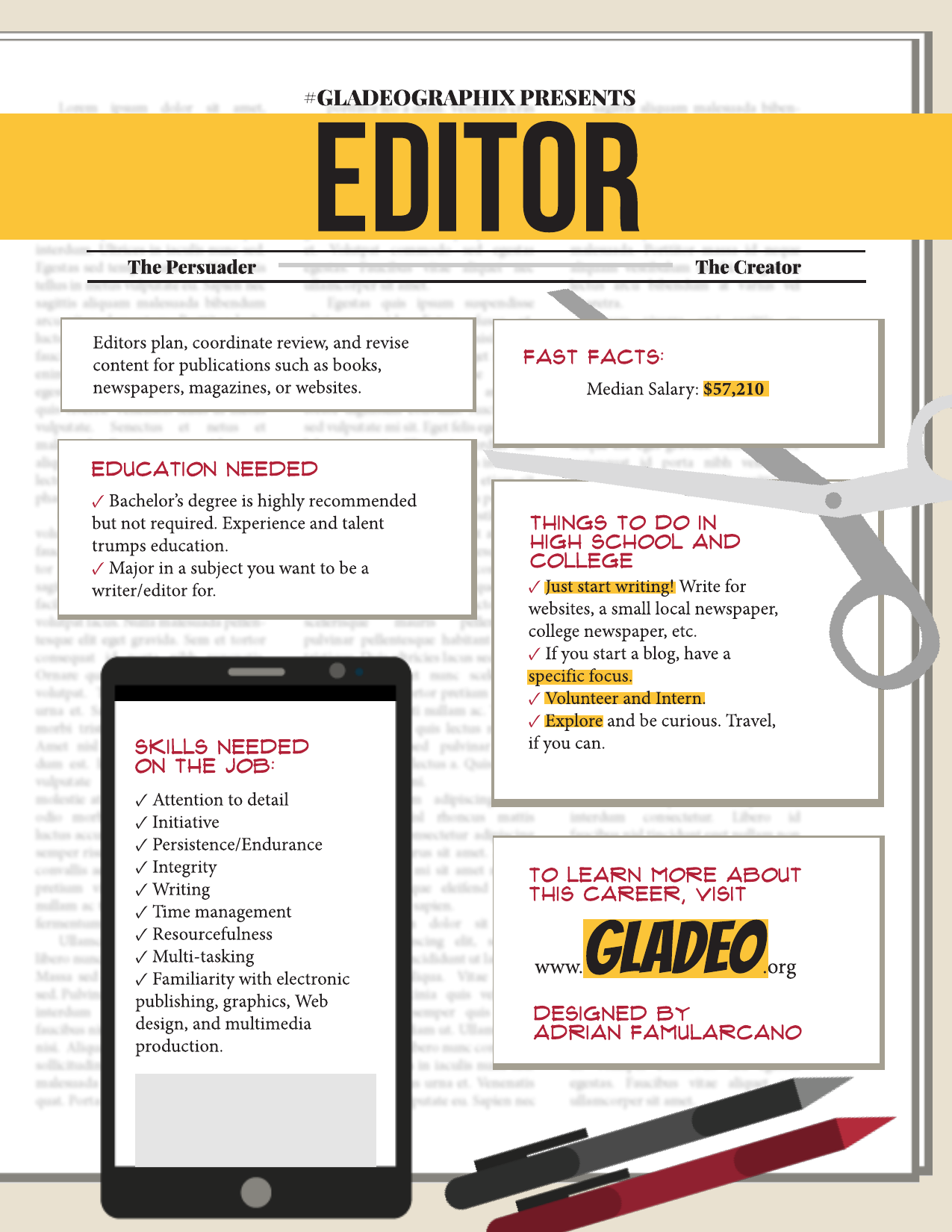Spotlights
Acquisitions Editor, Business Editor, Editor, Features Editor, Legal Editor, News Editor, Newspaper Copy Editor, Science Editor, Sports Editor, Web Editor
Editors plan, coordinate review, and revise content for publications such as books, newspapers, magazines, or websites.
- Meet and talk to interesting people on a regular basis.
- Learn about so many things on a regular basis.
- Work in a dynamic environment!
- Reads content and corrects for errors in spelling, punctuation, and grammar.
- Rewrites copy to make it easier for people to understand.
- Verifies facts, using standard reference sources.
- Evaluates submissions from writers to decide what to publish.
- Works with writers to help their ideas and stories succeed.
- Plans the content of publications according to the publication's style and editorial policy.
- Develops story and content ideas while being mindful of the audience.
- Allocates space for the text, photos, and illustrations that make up a story.
- Approves final versions submitted by staff.
- Attention to detail
- Empathy
- Initiative
- Persistence/Endurance
- Integrity
- Writing
- Time management
- Resourcefulness
- Multi-tasking
- Familiarity with electronic publishing, graphics, Web design, and multimedia production
*Note: These positions and their responsibilities vary from company to company.
- Copy Editors review copy for errors in grammar, punctuation, and spelling and check the copy for readability, style, and agreement with editorial policy. They suggest revisions, such as changing words and rearranging sentences and paragraphs to improve clarity or accuracy. They also may carry out research, confirm sources for writers, and verify facts, dates, and statistics. In addition, they may arrange page layouts of articles, photographs, and advertising.
- Editorial Assistants are primarily there for fact checking. They also get to write the short blurbs introducing a story or short excerpts. They are encouraged to share story ideas at meetings.
- Assistant Editors have responsibility for a particular subject, such as local news, international news, feature stories, or sports for the publication.
- Associate Editors are responsible for writing and/or assigning (to other writers) the FOB* (Front of the Book) and BOB** (Back of the Book) columns and stories.
- Senior Editor/Assigning Editor refers to an editor who assigns stories, usually features, to freelance writers. This is usually not a title on a masthead, just a way to distinguish between to an editor who assigns stories to outside writers rather than one who edits and/or writes stories in-house.
- Managing Editor is usually responsible for overseeing the actual page production of the magazine and making sure each issue reaches the printer on time. In some organizations, they are in charge of staffing and budgets. They are also the liason between the editorial and advertising department. They usually do not edit or write.
- Editor-in-Chief is the top editorial position at most magazines. But sometimes it is the Managing Editor.
Editorial Department (When you think of an editor, this is the department you are thinking of)
Editorial Assistants spend 1-3 years learning the book publishing process. They work with the editor and their job is to fill in the gaps so that includes filing, letters, P&L forms, reading proposals, talking to authors on the phone, and doing your best to make the editor look good.
Assistant Editors spend time doing similar tasks as the editorial assistant but now they are starting to focus on how to edit a manuscript. Many are asked to work in one particular area (business, health…etc).
Associate Editors spend time editing manuscripts. That would include copy-editing, developmental editing, reading and reviewing.
Editors/Acquisitions Editors spend time editing and acquiring new material. So they:
- read new manuscripts and meet with writers
- acquire the book from a literary agent
- make sure the author stays on track with the manuscript
- edit the manuscript
- be an advocate for the book to the marketing, publicity and sales department
Editorial Director/Editor-in Chief is usually the person in charge of directing the day-to-day efforts of the editors. More managerial position.
Publisher is to be the visionary and the business head of the publishing house. The editorial staff reports to the publisher.
Managing Editorial (Production) Department
This department is in charge of copyediting, text design/layout and proofreading. They shepherd the manuscript through each of these stages to final bound book. This department is more concerned with the nuts and bolts, and their primary duty is to manage editorial schedules for the books acquired by the editorial staff.
Production Assistants assist the production editor with her tasks.
Production Editors oversee the production process and makes sure that all parts are in place. They
- manage reprints
- interact with printers and handling estimates, purchase orders, corrections, scheduling, and invoices
- conduct illustration and photo research for new cover and interior designs
- manage our freelance proofreaders, indexers, and illustrators
- review and mark up page proofs and covers and jackets of new books and resolve outstanding issues with editors, authors, and freelancers
Managing Editors are the head of the managing editorial department.
Copy Editors review copy for errors in grammar, punctuation, and spelling and check the copy for readability, style, and agreement with editorial policy. They suggest revisions, such as changing words and rearranging sentences and paragraphs to improve clarity or accuracy. Many times, copy editors are freelance.
- Very competitive: it is even difficult to get an un-paid internship at a prestigious magazine.
- However, I don’t think you only need to get an internship at “Vogue” or a huge NY magazine. Sometimes it’s better to work a smaller establishment and get more responsibilities, write more so you can get more clips. Really figure out your focus. If you want to work in the big magazine world for your whole career, then it’s nice to intern and work your way up. But if you want to be a writer and write for various publications, there’s a lot of other ways to enter, survive and thrive.” Amy Westervelt, Editor and writer
- You will start off at a magazine as an intern or editorial assistant or social media coordinator. Know your place. Learn the etiquette of the magazine you are working for but strike a good balance between being humble/”no entitlement complex” but also proactive.
- Strict production deadlines, the work can be stressful and sometimes tiring.
The industry is changing so there are not as many traditional editors. Editors who have adapted to online media and are comfortable writing for and working with a variety of electronic and digital tools should have an advantage in finding work.
- Was always curious.
- Liked hearing people’s stories – genuinely interested in people and their story and interests.
- Writing!
- Loved to read!
- Had really good vocabulary.
- Literary Editors need a bachelor’s degree in English, journalism, or other communications. Some complete a Master of Fine Arts program EXPERIENCE AND TALENT trumps education.
- Major in a subject you want to be a writer/editor for: Government, Economics, Environmental Science, Fashion Design…etc.
- Editors should be very familiar with common style guides, including in-house guidelines
- They must also have business acumen and understand markets and publishing trends
- Most have backgrounds in other types of editing, fiction or nonfiction writing, or news reporting, and have experience with style guides such as the Chicago Manual of Style, the Associated Press (AP) Stylebook, and Modern Language Association (MLA)
- Many students gain practical experience through internships such as the American Society of Magazine Editors’ Magazine Internship Program
- Additional ad hoc certifications can help bolster your credentials, such as UCLA Extension’s Editing and Publishing cert
Literary Editors should know to use desktop publishing software
- Stock up on courses in English, writing, communications, speaking, and business
- Reads books, magazine articles, and news stories constantly, focusing on high-quality works and publications
- Just start writing! You can do this when you are in college and even in high school. Write for websites, a small local newspaper, college newspaper..etc. (Note: Don’t just write for college paper because everybody does that so that doesn’t make you STAND out. Work for other places. Build up clips.)
- If you start blog, be sure to have specific focus: not a blog about “YOUR LIFE”.
- Example) A recent college graduate wanted to work for one of the NY prestigious magazines. She decided to start a blog that interviewed 100 business leaders in 100 days. The blog showed initiative, good ideas, her ability to connect with important people and interview them well. Her blog got attention and then she was hired by a prestigious publication.
- Volunteer and Intern: Jobs are somewhat concentrated in major media and entertainment markets—Boston, Chicago, Los Angeles, New York, and Washington, DC—but improved communications and Internet capabilities allow writers and authors to work from almost anywhere. But starting off, I would recommend moving to a city where there is a lot going on. You can intern at a non-profit or at your university.
- Gain exposure to many types of editing, such as copy editing, developmental editing, proofreading, and line editing
- Get familiar with various editing programs like Grammarly, but don’t rely on them as a crutch
- Develop strong organizational habits, as you’ll need to keep track of changes and revisions to multiple manuscripts
- Advertise your freelance editing services in the local area or online on platforms such as Upwork
- Consider taking a MasterClass related to writing and editing, such as The 5 Essential Elements of a Good Story
Keep applying for editor internships until you get picked up for one! - Check out interviews with editors and writers
Study how-to books and articles (see our list of Resources > Websites) - Join professional organizations to learn about trends and grow your network
- Explore and be curious: lean about new things, new events, new people. Travel, if you can.
- 3.7% with HS Diploma
- 4% with Associate’s
- 56.6% with Bachelor’s
- 19.7% with Master’s
- 4.8% with Professional
(% of employees aged 25 to 44 in the occupation whose highest level of educational attainment is)

- Figure out what kind of editor you want to be:
- Identify which industry you want to work in: If you like sports, a sports editor. If you love literature, a book editor.
- Identify which type of editing: Content editor – writing skills, Copy editor – grammar skills
- Move to where the most editors are! Per BLS, the states with the highest employment for these jobs are New York, California, Texas, Illinois, and the District of Columbia
- Must have clips, which are copies of your published articles. Most writers save copies of every story they've ever published, from high school and onward. Here’s how to get clips:
- Write for (free, low-pay) sites. If you are new, you should write a story first. But if you can write a very convincing pitch, then a pitch might be enough. For example) Rumpus, Awl are websites that cover news and culture and hire new writers. Exo Jane is constantly looking for free, low pay contributors.
- Intern at a publication: e-mail the associate editor of the magazine that you want to intern at and inquire about the internship. The e-mail needs to be well written and specific. Don’t make it too long.
- Apply for the editorial assistant position: this position fact checks and potentially writes the short blurbs or shorter stories.
- Apply for the social media coordinator position (if you are not having luck with the editorial assistant position): There’s a general assumption that if you are young, you are good with social media.
- For some smaller print magazines, they might hire a web writer, web editor (less experienced). Show your clips and e-mail the associate editor.
- Rule of thumb when contacting an editor for an internship or job: You have to be aggressive but also respectful. Essentially, this is what you have to do when you need to interview somebody for a story.
- Be proactive, a problem solver and resourceful.
- Connectors: Network a lot. If you know a lot of people, you will always have ideas for new stories. Go to conferences.
- Go the extra mile: Provide images, more contacts, more than what it expected. People will then want to work with you again.
- Know your place: Don’t act entitled. Understand the culture and etiquette of where you are working.
- Check out GORKANA: They put out a weekly newsletter that covers media shifts, new hires (editors) and their contact information as well as job postings.
- Check out Media Bistro: With a subscription, you will have access to a database of all the publications. The information is great because they tell you how to pitch to each publication: what they are looking for, how much they pay, and their contact information. You can also put up your profile with your clips and people will contact you for gigs.
- Set Google news alerts for ideas that you are interested in.
- Read a lot and keep up with the trends.
Websites
- American Copy Editors Society
- American Society of Magazine Editors
- Bay Area Editors’ Forum
- Council of Science Editors
- Editorial Freelancers’ Association
- International Society of Managing and Technical Editors
- Investigative Reporters and Editors
- MPA - The Association of Magazine Media
- National Association of Black Journalists
- National Newspaper Association
- Northwest Independent Editors Guild
- San Diego Professional Editors Network
- Society of American Business Editors and Writers
Books
- Developmental Editing: A Handbook for Freelancers, Authors, and Publishers, by Scott Norton
- Revision and Self-Editing for Publication: Techniques for Transforming Your First Draft into a Novel That Sells, by James Scott Bell
- The Editor's Companion: An Indispensable Guide to Editing Books, Magazines, Online Publications, and More, by Steve Dunham
- What Editors Do: The Art, Craft, and Business of Book Editing, by Peter Ginna
“Be nice to everybody you come into contact with because a) that’s just a decent thing to do as a human being b) since there is so much turnover in the media, somebody who was your intern one day could be your boss in the future.” Amy Westervelt, Editor and Freelance Writer (Regular contributor to Forbes, Wall Street Journal, Slate)
“Strike a good balance of being confident and smart but not arrogant and entitled.”
Newsfeed

Featured Jobs

Online Courses and Tools

Annual Salary Expectations
New workers start around $51K. Median pay is $75K per year. Highly experienced workers can earn around $101K.






